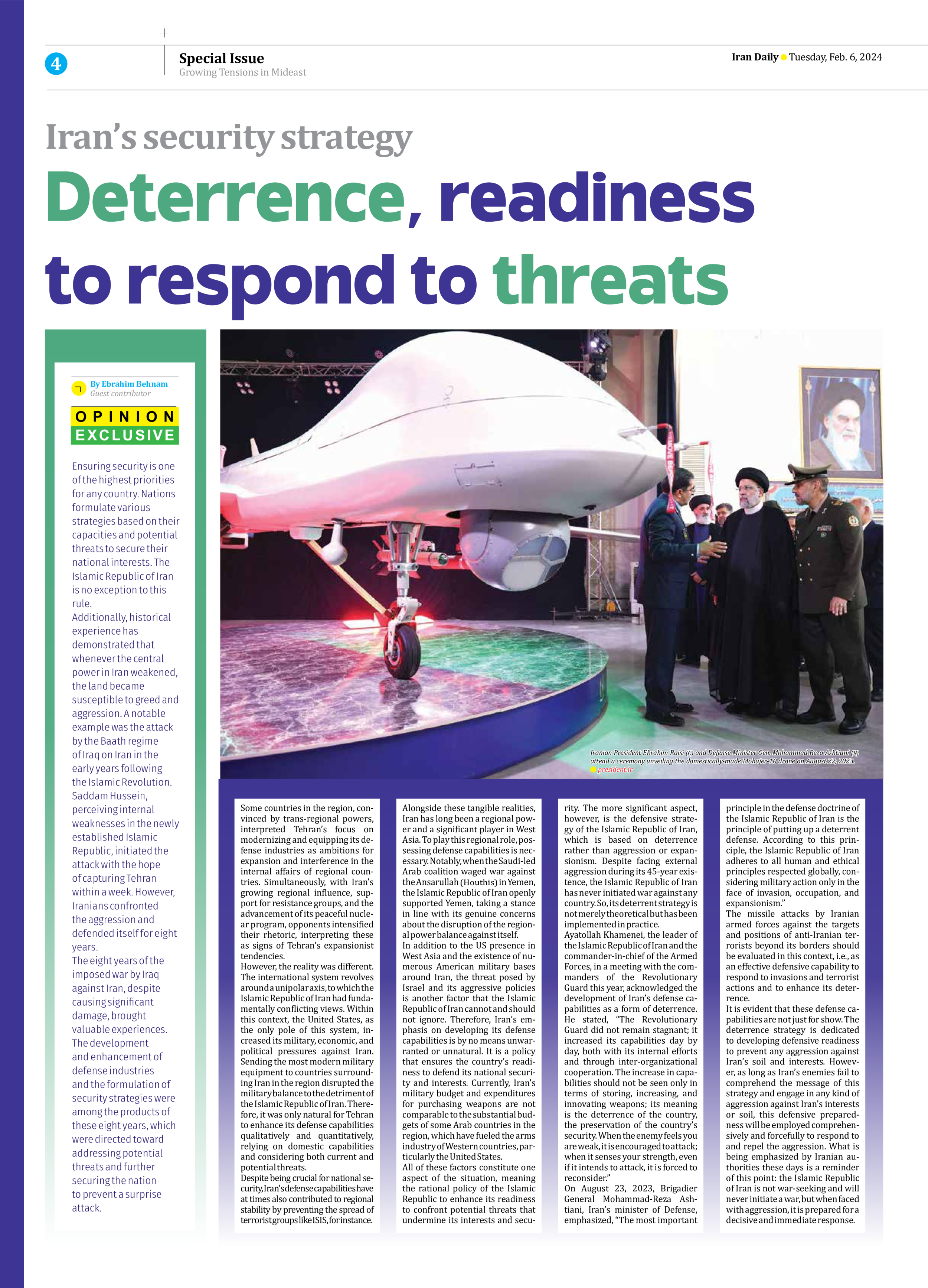
Iran’s security strategy
Deterrence, readiness to respond to threats
By Ebrahim Behnam
Guest contributor
Ensuring security is one of the highest priorities for any country. Nations formulate various strategies based on their capacities and potential threats to secure their national interests. The Islamic Republic of Iran is no exception to this rule.
Additionally, historical experience has demonstrated that whenever the central power in Iran weakened, the land became susceptible to greed and aggression. A notable example was the attack by the Baath regime of Iraq on Iran in the early years following the Islamic Revolution. Saddam Hussein, perceiving internal weaknesses in the newly established Islamic Republic, initiated the attack with the hope of capturing Tehran within a week. However, Iranians confronted the aggression and defended itself for eight years.
The eight years of the imposed war by Iraq against Iran, despite causing significant damage, brought valuable experiences. The development and enhancement of defense industries and the formulation of security strategies were among the products of these eight years, which were directed toward addressing potential threats and further securing the nation to prevent a surprise attack.
Some countries in the region, convinced by trans-regional powers, interpreted Tehran’s focus on modernizing and equipping its defense industries as ambitions for expansion and interference in the internal affairs of regional countries. Simultaneously, with Iran’s growing regional influence, support for resistance groups, and the advancement of its peaceful nuclear program, opponents intensified their rhetoric, interpreting these as signs of Tehran’s expansionist tendencies.
However, the reality was different. The international system revolves around a unipolar axis, to which the Islamic Republic of Iran had fundamentally conflicting views. Within this context, the United States, as the only pole of this system, increased its military, economic, and political pressures against Iran. Sending the most modern military equipment to countries surrounding Iran in the region disrupted the military balance to the detriment of the Islamic Republic of Iran. Therefore, it was only natural for Tehran to enhance its defense capabilities qualitatively and quantitatively, relying on domestic capabilities and considering both current and potential threats.
Despite being crucial for national security, Iran’s defense capabilities have at times also contributed to regional stability by preventing the spread of terrorist groups like ISIS, for instance.
Alongside these tangible realities, Iran has long been a regional power and a significant player in West Asia. To play this regional role, possessing defense capabilities is necessary. Notably, when the Saudi-led Arab coalition waged war against the Ansarullah (Houthis) in Yemen, the Islamic Republic of Iran openly supported Yemen, taking a stance in line with its genuine concerns about the disruption of the regional power balance against itself.
In addition to the US presence in West Asia and the existence of numerous American military bases around Iran, the threat posed by Israel and its aggressive policies is another factor that the Islamic Republic of Iran cannot and should not ignore. Therefore, Iran’s emphasis on developing its defense capabilities is by no means unwarranted or unnatural. It is a policy that ensures the country’s readiness to defend its national security and interests. Currently, Iran’s military budget and expenditures for purchasing weapons are not comparable to the substantial budgets of some Arab countries in the region, which have fueled the arms industry of Western countries, particularly the United States.
All of these factors constitute one aspect of the situation, meaning the rational policy of the Islamic Republic to enhance its readiness to confront potential threats that undermine its interests and security. The more significant aspect, however, is the defensive strategy of the Islamic Republic of Iran, which is based on deterrence rather than aggression or expansionism. Despite facing external aggression during its 45-year existence, the Islamic Republic of Iran has never initiated war against any country. So, its deterrent strategy is not merely theoretical but has been implemented in practice.
Ayatollah Khamenei, the leader of the Islamic Republic of Iran and the commander-in-chief of the Armed Forces, in a meeting with the commanders of the Revolutionary Guard this year, acknowledged the development of Iran’s defense capabilities as a form of deterrence. He stated, “The Revolutionary Guard did not remain stagnant; it increased its capabilities day by day, both with its internal efforts and through inter-organizational cooperation. The increase in capabilities should not be seen only in terms of storing, increasing, and innovating weapons; its meaning is the deterrence of the country, the preservation of the country’s security. When the enemy feels you are weak, it is encouraged to attack; when it senses your strength, even if it intends to attack, it is forced to reconsider.”
On August 23, 2023, Brigadier General Mohammad-Reza Ashtiani, Iran’s minister of Defense, emphasized, “The most important principle in the defense doctrine of the Islamic Republic of Iran is the principle of putting up a deterrent defense. According to this principle, the Islamic Republic of Iran adheres to all human and ethical principles respected globally, considering military action only in the face of invasion, occupation, and expansionism.”
The missile attacks by Iranian armed forces against the targets and positions of anti-Iranian terrorists beyond its borders should be evaluated in this context, i.e., as an effective defensive capability to respond to invasions and terrorist actions and to enhance its deterrence.
It is evident that these defense capabilities are not just for show. The deterrence strategy is dedicated to developing defensive readiness to prevent any aggression against Iran’s soil and interests. However, as long as Iran’s enemies fail to comprehend the message of this strategy and engage in any kind of aggression against Iran’s interests or soil, this defensive preparedness will be employed comprehensively and forcefully to respond to and repel the aggression. What is being emphasized by Iranian authorities these days is a reminder of this point: the Islamic Republic of Iran is not war-seeking and will never initiate a war, but when faced with aggression, it is prepared for a decisive and immediate response.







